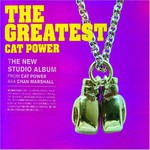The Greatest
Studio Album by Cat Power released in 2006The Greatest | |
Living Proof | |
Lived in Bars | |
Could We | |
Empty Shell | |
Willie | |
Where Is My Love | |
The Moon | |
Islands | |
After It All | |
Hate | |
Love & Communication | |
Up and Gone | |
Dreams |
The Greatest review
On The Greatest Chan Marshall effectively receives her Southern inheritance
The reclamation of the American South has not been limited to hip-hop. An increasing number of artists – Frank Black and My Morning Jacket to name a couple – have recently tapped the region’s resources, from dated recording equipment to idle session warriors. Cat Power’s Chan Marshall is the latest student of the South, her musical ideology inching closer to her native Georgia since 1998’s Moon Pix. The Greatest, however, is the most fruitful and complete work to come from the underground’s recent fixation, an album of surprising compromise and lasting faith. Recorded in a week with a group of Memphis session veterans – Teenie Hodges on guitar, Leroy "Flick" Hodges on bass, drummer Steve Potts among them – on The Greatest Marshall effectively receives her Southern inheritance: buoyant horn fills, mercury Telecaster leads, sawing violins. This is not a greatest hits album, despite the title. It contains all-original songs written by Chan Marshall. The combination of her superbly evocative and flexible voice, plus some of the greatest Southern soul players, has produced a masterpiece.
Several songs successfully use a faster beat
The album beings with the melancholy title track which is a gorgeous ballad. With its mournful style, haunting background singers and beautiful instruments, this song is a prime of example of the amazing Southern soul that Cat Power channels. Where Is My Love is another song that will stay with you long after it has ended its run. Reflective of its title, Islands is almost sunny, but its walking bass and slide guitar provide the bed for lyrics about eternal sleep. This album is not all molasses, with several songs successfully using a faster beat, such as Willie. Living Proof is an upbeat crooner that amazingly utilizes the melotronic keyboard. While some may argue that the album begins to straddle the line of subtlety and boredom as it progresses, but Cat Power's detractors miss the understated triumph of these tracks. Lived In Bars is slow, but the writing is sharp. Could We does not have the fastest momentum but Marhsall quietly wins over the audience. Delivered starkly, Empty Shell could've been another entry in Cat Power's deeply dark catalog, but here, with hoedown violins and smart backing vocals, it sounds like classic country.
The Greatest may just be the happiest of Cat Power’s works to date
Chan Marshall’s albums are finely crafted to make depression sound beautiful, even downright alluring. However, despite lyrics of jealousy (Empty Shell), love-scorned suicide (Islands) and abuse (After It All), The Greatest may just be the happiest of Cat Power’s works to date. There is spindly, shaky optimism to be found within the dark themes. Al Green's old compatriots serve the songs with championship restraint, adding colors and textures that Marshall never would've found with indie-rockers, but that never cheapen the impact. The addition of the Southern stylings easily complement Marshall's understated voice. From the first and titular tune, it's clear that the results of this experiment are uniformly awesome. The sultry-voiced artiste sounds fully at home within these songs, these lovely analog Southern sounds that bridge black and white music. The Greatest makes it clear just how much Chan Marshall grows with each album she releases. This is the most listenable Cat Power album she has made, and one that could easily win her lots of new fans. It's also far from a sell-out — The Greatest sounds like the album Marshall wanted to make, without any specific (or larger) audience in mind.

